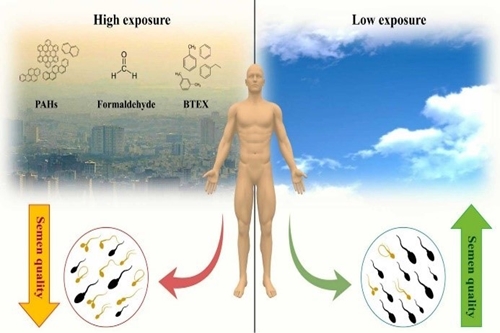The consequences of climate change and male reproductive health: A review of the possible impact and mechanisms

Introduction
Climate change, characterized by increased greenhouse gas emissions, rising temperatures, and extreme weather variations, poses a serious threat to male reproductive health. These changes lead to environmental stress, malnutrition, air pollution, cardiovascular and infectious diseases, psychological stress, and heat waves. These factors disrupt male fertility through oxidative stress, hormonal dysfunction, and direct damage to testicular cells. Infertility affects approximately 15% of couples, with male-related issues accounting for 20% of cases, often linked to hormonal imbalances, reproductive tract defects, and impaired sperm production.
Climate Change Factors Affecting Male Fertility
- Heat Stress: Rising global temperatures negatively impact testicular function, reducing testosterone levels, disrupting sperm production, and increasing apoptosis. Short-term exposure activates heat shock proteins (HSP) to protect cells, but prolonged exposure weakens this defense, leading to increased cellular damage.
- Cold Stress: Severe cold, intensified by climate change, reduces testosterone levels and impairs spermatogenesis. It may also increase cortisol levels, suppressing testicular function.
- Malnutrition: Climate change affects food resources and reduces nutritional quality, disrupting sex hormone production, lowering sperm quality, and altering testicular structure.
- Air Pollution: Increased greenhouse gases like carbon dioxide and particulate matter decrease reproductive performance, reducing testosterone levels, lowering sperm quality, and increasing the risk of erectile dysfunction.
- Respiratory Infections: Air pollution and temperature fluctuations increase susceptibility to respiratory infections, which can impair testosterone production and testicular function. Viral infections like SARS-CoV-2 also negatively affect steroidogenesis.
- Sexually Transmitted Infections (STIs): Climate change contributes to the rising prevalence of STIs like HIV, which lower testosterone levels and damage testicular function.
- Cardiovascular Diseases: Higher temperatures increase the incidence of cardiovascular diseases, which are linked to reduced testosterone levels and erectile dysfunction.
- Cancer: Climate change increases exposure to carcinogens such as air pollutants and ultraviolet radiation, raising the risk of testicular and hormone-related cancers.
Prevention and Treatment Strategies
- Antioxidant Supplements: Nutrients such as selenium, vitamin E, coenzyme Q10, zinc, and omega-3 fatty acids help reduce oxidative damage caused by heat stress.
- Dietary Interventions: Compounds like L-arginine and betaine can enhance sperm quality and sexual desire while mitigating heat stress effects.
- Herbal Medicine: Certain traditional plants enhance reproductive function. These includeLycium barbarum,Mondia whitei,Allium cepa L.,Kigelia africana, andAllium sativum L.These natural substances offer benefits such as increased sexual arousal and performance, improved sperm parameters, anti-apoptotic effects, antimicrobial properties, and free radical neutralization.
Conclusion
Climate change negatively impacts male fertility through factors such as heat stress, cold stress, air pollution, and malnutrition. Therefore, adopting preventive strategies, including antioxidant supplements, proper nutrition, and herbal medicines, is essential to maintaining reproductive health in the face of climate change.
Reference: Akhigbe RE, Oyedokun PA, Akhigbe TM, Hamed MA, Fidelis FB, Omole AI, Adeogun AE, Akangbe MD, Oladipo AA. The consequences of climate change and male reproductive health: A review of the possible impact and mechanisms. Biochem Biophys Rep. 2024 Dec 5;41:101889. doi: 10.1016/j.bbrep.2024.101889. PMID: 39717849; PMCID: PMC11664087.



نظر دهید